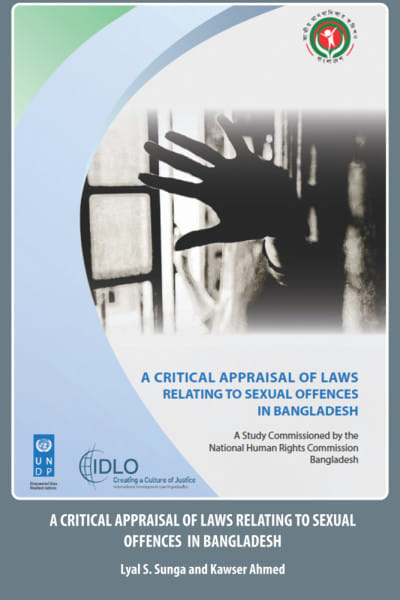NHRC study report advocates for reform

Having noticed the high incidences of sexual violence in recent times, the National Human Rights Commission of Bangladesh (NHRC-BD) in 2015 published a Study Report titled, 'A Critical Appraisal of Laws Relating to Sexual Offences in Bangladesh' (hereinafter 'the Study') jointly authored by Dr. Lyal S. Sunga, Special Advisor on Human Rights and Humanitarian Law, International Development Law Organization (IDLO), and Mr. Kawser Ahmed, Advocate, Supreme Court of Bangladesh. The Study mainly focuses on three fields of law, namely, the penal laws, the laws relating to medical examination and the law of evidence – all of which together form the mainstay of administration of criminal justice system relating to trial and punishment of sexual offences.
The Study attests a significant observation that sexual offences, according to the applicable penal laws in Bangladesh, mainly refers to rape which is understood as non-consensual penile cohabitation between male and female. As a result, the definitions of sexual offences in the penal laws are not only obsolete, but also too narrow in scope to address many other forms of sexual violence. The authors mark that this rigid approach has continued to be a dominant feature even in the recent laws of the country.
Besides definitional lacunae, the Study identifies 'medical examination' as the Achilles' heel of the entire legal regime concerning sexual offenses in Bangladesh. The Study reveals that despite being treated with high importance in many reported cases decided by the higher judiciary, there is almost no law that regiments medical examination procedure to be performed by the forensic experts. The Study unfailingly unveils that despite much technological advancement with regard to medico-legal evidence, Bangladesh is yet to accommodate them in its legal framework.
As regards the laws of evidence, the Study argues that section 155 (4) of the Evidence Act, 1872 by allowing the accused to adduce evidence so as to prove immoral character of the victim has put the victim in an unequal position vis-à-vis the accused.The authors argue that the matter in issue in such a situation should be the character of any alleged perpetrator, not that of the victim – because the allegation of rape relates not to the culpability of the woman, but to the perpetrator (p. 30). Another major feature of the Study is that it justifiably criticises the court's inclination to determine victim's 'consent' from 'injury marks' on her body.
That the existing penal provisions concerning sexual offences only recognise 'women' and 'children' as victims of sexual offences is also a noteworthy finding of the Study. The principal legislations, for instance, the Penal Code, 1860 and the Prevention of Cruelty to Women and Children Act, 2000 do not explicitly recognise transgender persons or hermaphrodites (commonly known as 'hijra' in Bengali) as possible victims of sexual offences. On the contrary, the worst aspect of the law is that these people can be prosecuted for sexual offences (e.g. sodomy under section 377 of the Penal Code). Apart from this, the Study could have shed light upon issues like rape leading to teen pregnancy or rape of disabled girls or women. It could have also discussed about the absence of legal provisions relating to reparations to the victims of sexual offences in Bangladesh.
The Study appends a list of cases decided by the higher judiciary – which will be immensely helpful for the researchers to work further in this area. In addition, the Study has recommended a number of reform proposals so as to address the lacunae of the prevailing laws relating to sexual offences in Bangladesh. It is hoped that the lawmakers of the country will pay due attention to these reform proposals.
The reviwer is Lecturer in Law, Bangladesh University of Professionals (BUP).

 For all latest news, follow The Daily Star's Google News channel.
For all latest news, follow The Daily Star's Google News channel. 



Comments